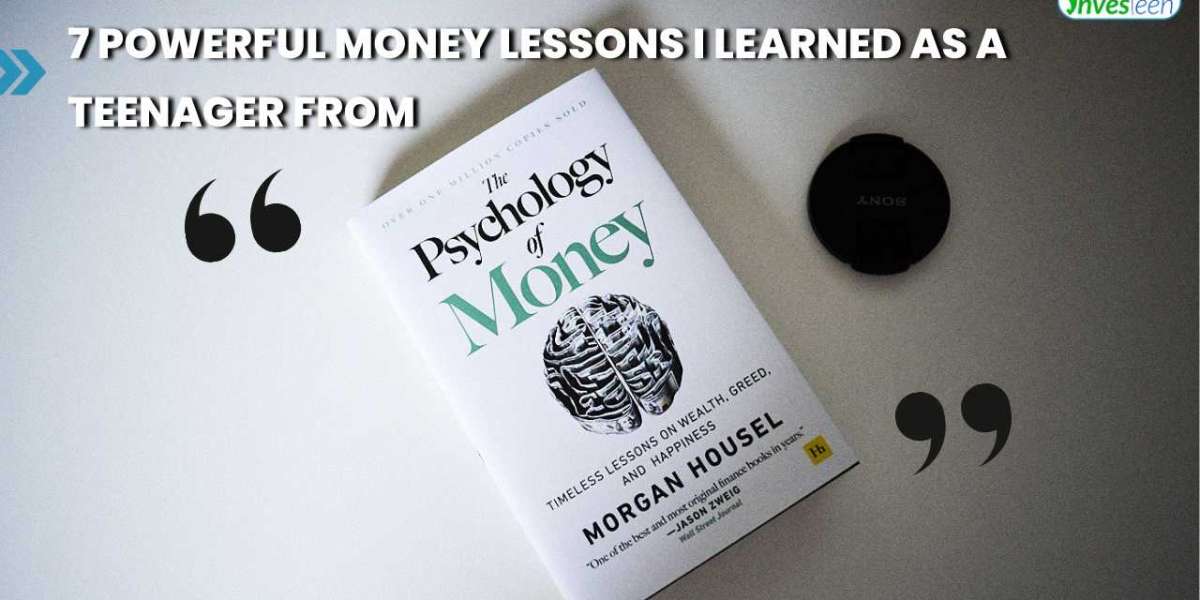Introduction: Why Financial Wisdom Matters Early
As a teenager, diving into Morgan Housel's book The Psychology of Money was a game-changer. The insights and stories shared in the book completely reshaped my understanding of money and its influence on life. These principles didn’t just enhance my financial awareness but also helped me adopt habits that set the foundation for a secure and fulfilling future.
In this article, I’ll share seven powerful lessons from the book that left a lasting impact on me as a teen. These insights can help any young person develop a healthier, smarter relationship with money. Let’s explore these lessons together:-
1. Time Is Your Greatest Financial Ally
One of the most crucial lessons I learned is the unmatched power of time. Starting early allows you to leverage the magic of compounding—where your money earns returns, and those returns generate even more returns. The earlier you begin saving and investing, the more you’ll benefit from this exponential growth.
Takeaway: Start small but stay consistent. Whether it’s a part-time job allowance or birthday money, investing early provides a massive advantage. Learn more about starting investments as a teen.
2. Don’t Let Emotions Control Your Money
Emotions like fear and greed often lead to impulsive decisions. Housel’s book highlights the importance of understanding the psychology behind money to make rational choices. Instead of reacting emotionally, develop a disciplined approach to managing your finances.
Pro Tip: Before making a financial decision, pause and evaluate it logically. Journaling your goals can help you stay on track. Explore tips for managing financial stress.
3. Embrace Delayed Gratification
In a world driven by instant gratification, practicing patience is a superpower. Choosing to save for bigger goals rather than spending impulsively can set you apart and pave the way for long-term financial success.
Example: Instead of buying the latest gadgets, focus on saving for experiences or investments that provide lasting value. Check out budgeting strategies for teens.
4. Diversification Protects Your Financial Future
Investing can feel daunting, but diversification makes it less risky. Spreading your investments across different assets—like stocks, bonds, and real estate—can help reduce the impact of market fluctuations.
Why It Matters: If one investment performs poorly, others can balance the losses. Diversification is your safety net. Learn the basics of diversified investing.
5. Mistakes Are Stepping Stones
Housel emphasizes that everyone makes financial mistakes, but the key is learning from them. Whether it’s overspending on wants or making a poor investment, reflecting on those mistakes helps you make better decisions moving forward.
Mindset Shift: Treat every mistake as a lesson, not a failure. Discover how to recover from financial setbacks.
6. Beware of Lifestyle Inflation
As your income grows, it’s tempting to increase your spending. However, falling into the trap of lifestyle inflation can derail long-term financial goals. Living below your means and saving the difference creates financial stability and freedom.
Smart Move: Prioritize needs over wants and invest the surplus income. Read tips to curb lifestyle inflation.
7. Money Alone Doesn’t Buy Happiness
While money is essential, it’s not the ultimate source of fulfillment. The book reinforces that meaningful relationships, experiences, and self-growth are what truly lead to happiness. Use money as a tool to support these aspects rather than chasing wealth for its own sake.
Focus: Balance financial success with personal growth and connections. Explore how to align money with happiness.
Conclusion: Start Your Journey Today
The lessons I learned from The Psychology of Money as a teenager have been invaluable. By understanding the power of time, controlling emotions, practicing patience, and embracing the other principles in the book, I’ve built a solid foundation for my financial future.
If you’re a teen, now is the perfect time to apply these insights. Start small, stay consistent, and let these lessons guide you to financial success. Remember, financial literacy isn’t just about money—it’s about creating a life of security and fulfillment.



